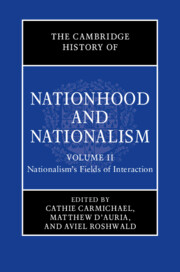Book contents
- The Cambridge History of Nationhood and Nationalism
- The Cambridge History of Nationhood and Nationalism
- The Cambridge History of Nationhood and Nationalism
- Copyright page
- Contents
- Figures
- Tables
- Contributors
- Part I Imperial and Postcolonial Settings
- Part II Transnational and Religious Missions and Identities
- 15 Liberalism and Nationalism: Trajectories of an Entangled Relationship
- 16 Marxism and the National Question
- 17 The Catholic Church
- 18 Islam and Nationalism
- 19 On Jewish Nationhood and Nationalism: A Historical Survey from Antiquity to the Establishment of the State of Israel
- 20 Buddhism
- Conclusion to Part II
- Part III Intersections: National(ist) Synergies and Tensions with Other Social, Economic, Political, and Cultural Categories, Identities, and Practices
- Index
- References
15 - Liberalism and Nationalism: Trajectories of an Entangled Relationship
from Part II - Transnational and Religious Missions and Identities
Published online by Cambridge University Press: 08 November 2023
- The Cambridge History of Nationhood and Nationalism
- The Cambridge History of Nationhood and Nationalism
- The Cambridge History of Nationhood and Nationalism
- Copyright page
- Contents
- Figures
- Tables
- Contributors
- Part I Imperial and Postcolonial Settings
- Part II Transnational and Religious Missions and Identities
- 15 Liberalism and Nationalism: Trajectories of an Entangled Relationship
- 16 Marxism and the National Question
- 17 The Catholic Church
- 18 Islam and Nationalism
- 19 On Jewish Nationhood and Nationalism: A Historical Survey from Antiquity to the Establishment of the State of Israel
- 20 Buddhism
- Conclusion to Part II
- Part III Intersections: National(ist) Synergies and Tensions with Other Social, Economic, Political, and Cultural Categories, Identities, and Practices
- Index
- References
Summary
Two of the most influential concepts of the long nineteenth century developed in a complex and entangled relationship that cannot be reduced to a mere dichotomy. At first sight, however, liberalism has often been interpreted “as both logically and morally incompatible with nationalism.”1 This incompatibility has been derived from the perspective of the early twentieth century when from the early 1920s onwards liberalism seemed to come under increasing pressure from both Bolshevism and fascism. Whether in its Italian version of fascism or in German National Socialism, European fascisms as the culmination of radical nationalism seemed to rely on the ultimate negation of those values and institutions which had been identified with the legacy of nineteenth-century liberalism, such as personal liberty, free trade, or a constitutional order. Hence the search for the early origins of the apparently obvious dichotomy between liberalism and nationalism followed the logic of retrospective teleology.
- Type
- Chapter
- Information
- The Cambridge History of Nationhood and Nationalism , pp. 331 - 350Publisher: Cambridge University PressPrint publication year: 2023

